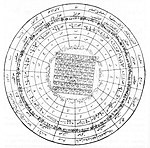Kitabu'l-Asmáʼ
| Part of a series on |
| Bábí Texts and Scriptures |
|---|
 |
| From the Báb |
| Compilations |
The Kitabu'l-Asmáʼ or Book of Divine Names (also known as the Chahar Shaʻn (The [Book of the] Four Grades))[1] is a book written by the Báb, the founder of Bábi religion, in Arabic[2] during his imprisonment in Máh-Kú and Chihriq in Iran (1847-1850). With a total volume of more than 3,000 pages, it is the largest revealed scripture in religious history.[3] Stephen Lambden describes the Kitabu'l-Asmáʼ as "one of the most theologically weighty or important writings of the Bab".[4]
At least twenty-six manuscripts exist,[1][5] and much of the text has not yet been located.[3] Some extracts are available in English in the volume Selections from the Writings of the Báb.[2]
Contents
The text is divided in nineteen unities (Vahid) and 361 gates (Báb; chapters).[3] and consists largely of "lengthy variations of invocations of the names of God'.[2] Each name is discussed in four different parts, each part written in a different 'mode of revelation':[6] divine verses, prayers, commentaries, and rational arguments.[7] The 361 chapters symbolize "all things" (Kull-i-Shayʼ) and the days of the year of the Badi' calendar.[8] Where the materials about the calendar are located in the Kitabu'l-Asmáʼ needs further research.[1]
The Báb gives explanations about many divine names and attributes[6] and describes how humanity can be spiritualized by recognizing the Manifestation of God.[3]
Notes
- ^ a b c Lambden, Stephen (2018). Kitab al-asma' - The Book of Names.
- ^ a b c Smith, Peter (2000). "Names, Book of". A concise encyclopedia of the Baháʼí Faith. Oxford: Oneworld Publications. p. 258. ISBN 1-85168-184-1.
- ^ a b c d Saiedi 2008, pp. 36
- ^ Lambden, Stephen. The Kitab al-asma'
- ^ Denis MacEoin (1992). The Sources for Early Bābī Doctrine and History. Leiden: Brill. pp. 91–92. ISBN 90-04-09462-8.
- ^ a b Saiedi 2008, pp. 45
- ^ Saiedi 2008, pp. 337
- ^ Saiedi 2008, pp. 336
References
- Saiedi, Nader (2008). Gate of the Heart. Waterloo, ON: Wilfrid Laurier University Press. ISBN 978-1-55458-035-4.
Further reading
- The Báb (1976). Selections from the Writings of the Báb. Wilmette, Illinois, USA: Baháʼí Publishing Trust. pp. 129–149. ISBN 1-931847-30-4.
External links
Online manuscripts (only a fraction of the size of the complete work):
- Kitabu'l-Asma' (2010; 481 pages)
- Kitab-i-Asma' (2005; 481 pages)
- INBA, Vol. 29 Tablets of the Bab - "The book of Names - Kitab-i-Asma" (336 pages)
- Kitab al-asma' I - The Book of Names or Chahar Shaʻn (The Book of the Four Grades), of Sayyid ʻAli Muhammad, the Bab (d. Tabriz 1850).
- The Kitab al-asma' II - Select Excerpts in Translation
